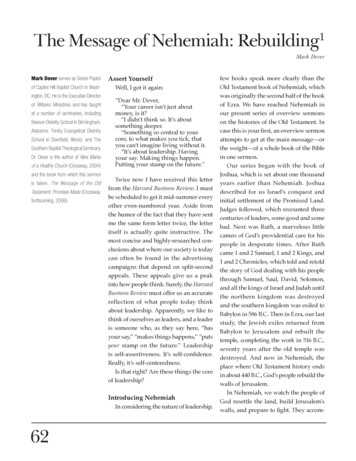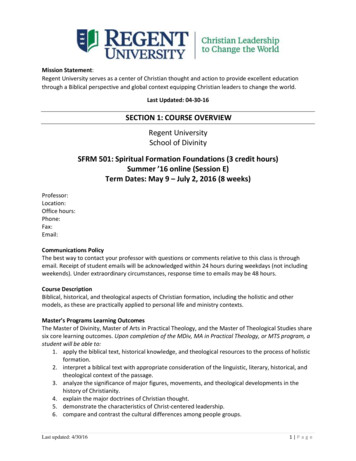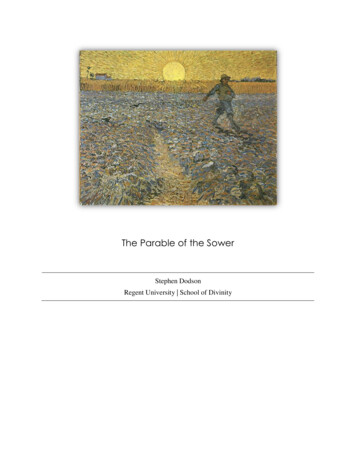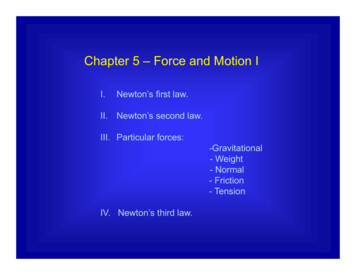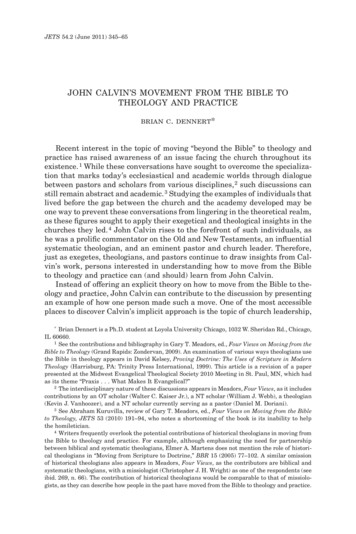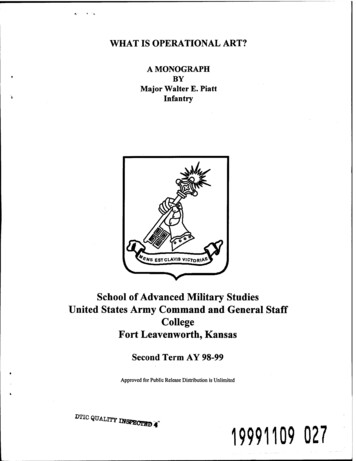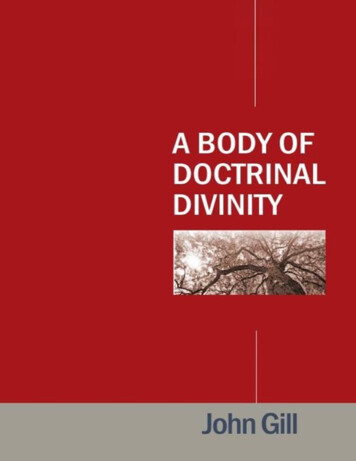
Transcription
Copyright Monergism Books
A Body of Doctrinal Divinityby John GillTable of ContentsBOOK I: Of God, His Words, Names, Nature, Perfections, andPersons.1. Of the Being of God.2. Of the Holy Scriptures.3. Of the Names of God.4. Of the Nature of God.5. Of the Attributes of God in General and of His Immutability inParticular.6. Of the Infinity of God, His Omnipresence and Eternity.7. Of the Life of God.8. Of the Omnipotence of God.9. Of the Omniscience of God.10. Of the Wisdom of God.11. Of the Will of God, and the Sovereignty of It.12. Of the Love of God.13. Of the Grace of God.14. Of the Mercy of God.15. Of the Long-Suffering of God.16. Of the Goodness of God.17. Of the Anger and Wrath of God.18. Of the Hatred of God.19. Of the Joy of God.20. Of the Holiness of God.21. Of the Justice or Righteousness of God.22. Of the Veracity of God.
23. Of the Faithfulness of God.24. Of the Sufficiency and Perfection of God.25. Of the Blessedness of God.26. Of the Unity of God.27. Of a Plurality on the Godhead; or, A Trinity of Persons in the Unity ofthe Divine Essence.28. Of the Personal Relations; or, Relative Properties Which Distinguishthe Three Divine Persons in the Deity.29. Of the Distinct Personality, and Deity of the Father.30. Of the Distinct Personality, and Deity of the Son.31. Of the Distinct Personality, and Deity of the Holy Spirit.BOOK II: Of the Acts and Works of God.1. Of the Internal Acts and Works of God; and of His Decrees in General.2. Of the Special Decrees of God, Relating to Rational Creatures, Angels,and Men; and Particularly of Election.3. Of the Decrees of Rejection, of Some Angels, and of Some Men.4. Of the Eternal Union of the Elect of God Unto Him.5. Of Other Eternal and Immanent Acts in God, Particularly Adoptionand Justification.6. Of the Everlasting Council Between the Three Divine Persons,Concerning the Salvation of Men.7. Of the Everlasting Covenant of Grace, Between the Father, and the Son,and the Holy Spirit.8. Of the Part Which the Father Takes in the Covenant.9. Of the Part the Son of God, the Second Person, Has Taken in theCovenant.10. Of Christ, as the Covenant-Head of the Elect.11. Of Christ, the Mediator of the Covenant.12. Of Christ, the Surety of the Covenant.13. Of Christ, the Testator of the Covenant.14. Of the Concern the Spirit of God Has in the Covenant of Grace.15. Of the Properties of the Covenant of Grace.16. Of the Complacency and Delight God Had in Himself, and the DivinePersons in Each Other.BOOK III: Of the Eternal Works of God.
1. Of Creation in General.2. Of the Creation of Angels.3. Of the Creation of Man.4. Of the Providence of God.5. Of the Confirmation of the Elect Angels, and the Fall of the Non-Elect.6. Of the Honour and Happiness of Man in a State of Innocence.7. Of the Law Given to Adam, and the Covenant made with Him in theState of Innocence.8. Of the Sin and Fall of our First Parents.9. Of the Nature, Aggravations, and Sad Effects of the Sin of Man.10. Of the Imputation of Adam's Sin to all His Posterity.11. Of the Corruption of Human Nature.12. Of Actual Sins and Transgressions.13. Of the Punishment of Sin.BOOK IV: Of the Acts of the Grace of God, Towards, and UponHis Elect in Time.1. Of the Manifestation and Administration of the Covenant of Grace.2. Of the Exhibitions of the Covenant of Grace in the Patriarchal State.3. Of the Exhibition of the Covenant of Grace Under the MosaicDispensation.4. Of the Covenant of Grace, as Exhibited in the Times of David, and theSucceeding Prophets, to the Coming of Christ.5. Of the Abrogation of the Old Covenant, or First Administration of it,and the Introduction of the New, or Second Administration of it.6. Of the Law of God.7. Of the Gospel.BOOK V: Of the Grace of Christ in His States of Humiliationand Exaltation, and in the Offices Exercised by Him in Them.1. Of the Incarnation of Christ.2. Of Christ's State of Humiliation.3. Of the Active Obedience of Christ in His State of Humiliation.4. Of the Passive Obedience of Christ, or of His Sufferings and Death.5. Of the Burial of Christ.
6. Of the Resurrection of Christ from the Dead.7. Of the Ascension of Christ to Heaven.8. Of the Session of Christ at the Right-Hand of God.9. Of the Prophetic Office of Christ.10. Of the Priestly Office of Christ.11. Of the Intercession of Christ.12. Of Christ's Blessing His People as a Priest.13. Of the Kingly Office of Christ.14. Of the Spiritual Reign of Christ.BOOK VI: Of the Blessings of Grace, and the Doctrines of It.1. Of Redemption by Christ2. Of the Causes of Redemption by Christ.3. Of the Objects of Redemption by Christ.4. Of those Text of Scripture Which Seem to Favour UniversalRedemption.5. Of the Satisfaction of Christ6. Of Propitiation, Atonement, and Reconciliation, as Ascribed to Christ.7. Of the Pardon of Sin.8. Of Justification.9. Of Adoption.10. Of the Liberty of the Sons of God.11. Of Regeneration.12. Of Effectual Calling.13. Of Conversion.14. Of Sanctification.15. Of the Perseverance of the Saints.BOOK VII: Of the Final State of Man.1. Of the Death of the Body.2. Of the Immortality of the Soul.3. Of the Separate State of the Soul Until the Resurrection, and ItsEmployment in that State.4. Of the Resurrection of the Body.5. Of the Second Coming of Christ, and His Personal Appearance.6. Of the Conflagration of the Universe.
7. Of the New Heavens and Earth, and the Inhabitants of Them.8. Of the Millennium, or Personal Reign of Christ with the Saints on theNew Earth a Thousand Years.9. Of the Last and General Judgment.10. Of the Final State of the Wicked in Hell.11. Of the Final State of the Saints in Heaven.BOOK I: Of God, His Words, Names, Nature,Perfections, and Persons.OF THE BEING OF GODHaving undertaken to write a System of Theology, or a Body of DoctrinalDivinity; and Theology being nothing else than a speaking of God, or adiscoursing concerning him; his nature, names, perfections, and persons;his purposes, providences, ways, works, and word: I shall begin with theBeing of God, and the proof and evidence of it; which is the foundation ofall religion; for if there is no God, religion is a vain thing; and it mattersnot neither what we believe, nor what we do; since there is no superiorBeing to whom we are accountable for either faith or practice.Some, because the being of God is a first principle, which is not to bedisputed; and because that there is one is a self-evident proposition, notto be disproved; have thought it should not be admitted as a matter ofdebate: but since such is the malice of Satan, as to suggest the contrary tothe minds of men; and such the badness of some wicked men as to listento it, and imbibe it; and such the weakness of some good men as to beharassed and distressed with doubts about it at times; it cannot beimproper to endeavor to fortify our minds with reasons and argumentsagainst such suggestions and insinuations. And my1. First argument to prove the Being of a God, shall be taken from thegeneral consent of men of all nations, in all ages of the world; amongwhom the belief of it has universally obtained; which it is not reasonableto suppose would have obtained, if it was not true. This has beenobserved by many heathen writers themselves. Aristotle says, "all men
have a persuasion of Deity, or that there is a God." Cicero observes,"There is no nation so wild and savage, whose minds are not imbued withthe opinion of the gods; many entertain wrong notions of them; but allsuppose and own the divine power and nature."And in another place he says, "There is no animal besides man that hasany knowledge of God; and of men there is no nation so intractable andfierce, although it may be ignorant what a God it should have, yet is notignorant that one should be had." And again, "It is the sense of allmankind, that it is "innate" in all, and is, as it were, engraved on themind, that there is a God; but what a one he is, in that they vary; but thathe is, none denies." And to the same sense are the words of Seneca,"There never was a nation so dissolute and abandoned, so lawless andimmoral, as to believe there is no God." So Aelianus relates, "None of thebarbarous nations ever fell into atheism, or doubted of the gods whetherthey were or not, or whether they took care of human affairs or not; notthe Indians, nor the Gauls, nor the Egyptians."And Plutarch has these remarkable words, "If you go over the earth, sayshe, you may find cities without walls, letters, kings, houses, wealth, andmoney, devoid of theaters and schools; but a city without temples andgods, and where is no use of prayers, oaths, and oracles, nor sacrifices toobtain good or avert evil, no man ever saw." These things were observedand said, when the true knowledge of God was in a great measure lost,and idolatry prevailed; and yet even then, this was the general sense ofmankind. In the first ages of the world, men universally believed in thetrue God, and worshiped him, as Adam and his sons, and their posterity,until the flood; nor does there appear any trace of idolatry before it, norfor some time after. The sins which caused that, and with which the worldwas filled, seem to be lewdness and impurity, rapine and violence.Some think the tower of Babel was built for an idolatrous use; and it maybe that about that time idolatry was set up; as it is thought to haveprevailed in the days of Serug: and it is very probable that when thegreater part of the posterity of Noah's sons were dispersed throughout theearth, and settled in the distant parts of it; that as they were remote fromthose among whom the true worship of God was preserved; they, bydegrees, lost sight of the true God, and forsook his worship; and this
being the case, they began to worship the sun in his stead, and which ledon to the worship of the moon, and the host of Heaven; which seem to bethe first objects of idolatry. This was as early as the times Job, whoplainly refers to it, (Job 31:26, 27). And, indeed, when men had cast offthe true object of worship, what more natural to substitute in his roomthan the sun, moon, and stars, which were above them, visible by them,and so glorious in themselves, and so beneficial to the earth and men onit? Hence the people of Israel were exhorted to take care that their eyeswere not ensnared at the sight of them, to fall down and worship them;and which in later times they did (Deuteronomy 4:19; 2 King 21:3).It appears also that men took very early to the deifying of their heroesafter death, their kings, and great personages, either for their wisdom andknowledge, or for their courage and valor, and martial exploits, and otherthings; such were the Bel, or Belus, of the Babylonians; the Baalpeor ofthe Moabites. ;and the Molech of the Phoenicians, and other Baalimlords, or kings, mentioned in the Scriptures: and such were Saturn,Jupiter, Mars, Mercury, Hercules; and the rest of the rabble of theheathen deities; and indeed their Lares, and Penates, or household gods,were no other than the images of their deceased parents, or more remoteancestors, whose memory they revered; and in process of time theirdeities became very numerous; they had gods many and lords many: evenwith the Jews, when fallen into idolatry, their gods were according to thenumber of their cities (Jeremiah 2:28).And as for the Gentiles, they worshiped almost everything; not only thesun, moon, and stars; but the earth, fire, and water; and various sorts ofanimals, as oxen, goats, and swine, cats and dogs, the fishes of the rivers,the river horse, and the crocodile, those amphibious creatures; the birdsof the air, as the hawk, stork, and ibis; and even insects, the fly; yes,creeping things, as serpents, the beetle, etc.; as also vegetables, onions,and garlic; which occasioned the satirical poet to say, "O holy nations,whose gods are born in their gardens!" Nay, some have worshiped thedevil himself, as both in the East and West Indies; and that for thisreason, that he might not harm them. Now though all this betrays thedreadful depravity of human nature; the wretched ignorance of mankind;and the sad stupidity men were sunk into; yet at the same time such
shocking idolatry, in all the branches of it, is a full proof of the truth andforce of my argument, that all men, in all ages and countries, have beenpossessed of the notion of a God; since, rather than to have no God, theyhave chosen false ones; so deeply rooted is a sense of Deity in the mindsof all men.I am sensible that to this it is objected, that there have been, at differenttimes, and in different countries, some particular persons who have beenreckoned atheists, deniers of the Being of a God. But some of these menwere only deriders of the gods of their country; they mocked at them asunworthy of the name, as weak and insufficient to help them; as theyreasonably might; just as Elijah mocked at Baal and his worshipers. Nowthe common people, because they so behaved towards their gods, lookedupon them as atheists, as such who did not believe there was any God.Others were so accounted, because they excluded the gods from anyconcern with human affairs; they thought they were other waysemployed, and that such things were below their notice, and notbecoming their grandeur and dignity to regard; and had much the samesentiments as some of the Jews had (Ezekiel 9:9; Zep. 1:12).But these men were not deniers of the existence of God, only of hisprovidence as to the affairs of the world: and others have been ratherpractical than speculative atheists, as the fool in Psalm 14:1, who not onlylive as if there was no God; but wish in their hearts there was none, ratherthan believe there is none; that so they might take their fill of sin, withoutbeing accountable to a superior Being. The number of real speculativeatheists have been very few, if any; some have boldly asserted theirdisbelief of a God; but it is a question whether their hearts and mouthshave agreed; at least they have not been able to maintain their unbelieflong without some doubts and fears. And at most this only shows howmuch the reason of man may be debased, and how low it may sink whenleft to itself: these few instances are only particular exceptions to ageneral rule; which is not destroyed thereby, being contrary to thecommon sense of mankind; even as it is no sufficient objection to thedefinition of man, as a rational creature, that there is now and then anidiot born of his race, so not to the general belief of Deity, that there isnow and then an atheist in the world.
It is further objected, that there have been whole nations in Africa andAmerica, who have no notion of Deity. But this is what has not beensufficiently proved; it depends upon the testimonies of travelers, andwhat one affirms, another denies; so that nothing can with certainty beconcluded from them. "I should rather question, says Herbert, LordCherbury, whether the light of the sun has shone on the remotest regions,than that the knowledge of the Supreme Being is hidden from them; sincethe sun is only conspicuous in its own sphere; but the Supreme Being isseen in everything." Diodorus Siculus says, a few of the Ethiopians wereof opinion there was no God; though before he had represented them asthe first and most religious of all nations, as attested by all antiquity.The Hottentots about the Cape of Good Hope have been instanced in, aswithout any knowledge of Deity: and certainly they are a most beastly andbrutish people that can be named, and the most degenerate of the humanspecies, and have survived the common instincts of humanity; yet,according to Mr. Kolben's account of them, published some years ago,they appear to have some sense of a Supreme Being, and of inferiordeities. They express a superstitious joy at new and full moons; and it issaid they pray to a Being that dwells above; and offer sacrifice of the bestthings they have, with eyes lifted up to Heaven. And later discoveries ofother nations, show the contrary to what has been asserted of them;which assertions have arose either from want of intimate knowledge ofthem, and familiar acquaintance with them, or from their dissolute,wicked, and irreligious lives; when, by conversing with them, it appearsthat they have a notion of the sun, or sky, or something or another beinga sort of deity.Thus it has been observed of the Greenlanders, that "they had neither areligion nor idolatrous worship; nor so much as any ceremonies to beperceived tending to it: hence the first missionaries entertained asupposition, that there was not the least trace to be found among them ofany conception of a divine Being, especially as they had no word toexpress him by. But when they came to understand their language better,they found quite the reverse to be true, from the notions they had, thoughvery vague and various, concerning the soul, and concerning spirits; andalso from their anxious solicitude about the state after death. And not
only so, but they could plainly gather from a free dialogue they had withsome perfectly wild Greenlanders, that their ancestors must havebelieved a supreme Being, and did render him some service; which theirposterity neglected by little and little, the further they were removed frommore wise and civilized nations; until at last they lost every justconception of the Deity; yet, after all, it is manifest, that a faint idea of adivine Being lies concealed in the minds even of this people, because theydirectly assent, without any objection, to the doctrine of a God, and hisattributes."And as to what is concluded from the irreligious lives of the inhabitants ofsome nations, we need not be sent to Africa and America for such atheistsas these; we have enough of them in our own nation; and I was just readyto say, we are a nation of atheists in this sense: and, indeed, all men in anunregenerate state, be they Jews or Gentiles, or live where they may, theyare "atheists"; as the apostle calls them, (Eph 2:12) they are "without Godin the world, being alienated from the life of God", (Eph 4:18) otherwisethere is such a general sense of Deity in mankind; and such a naturalinclination to religion, of some sort or another, though ever so bad, thatsome have thought that man should rather be defined as a religious thana rational animal. I take no notice of the holy angels, who worship Godcontinually; nor of the devils, who believe there is one God and tremble;my argument being only concerned with men.2. The second argument shall be taken from the law and light of nature;or from the general instinct in men, or impress of Deity on the mind ofevery man; that is, as soon as he begins to have the exercise of his rationalpowers, he thinks and speaks of God, and assents to the Being of a God.This follows upon the former, and is to be proved by it; for as Cicero says,"The consent of all nations in anything, is to be reckoned the law ofnature." And since all nations agree in the belief of a Deity, that must be apart of the law of nature, inscribed on the heart of every man. Senecamakes use of this to prove there is a God; he says: "because an opinion orsense of Deity, is "implanted" in the minds of all men." And so likewiseCicero, as observed before; and who calls them the notions of Deityimplanted and innate. And whoever believes the Mosaic account of thecreation of man, cannot doubt of this being his case, when first created;
since he is said to be made in the image, and after the likeness of God; forthe image of God surely could not be impressed upon him, withouthaving the knowledge of him implanted in him; and though man bysinning has greatly come short of this image and glory of God, yet thislight of nature is not wholly obscured, nor the law of nature entirelyobliterated in him; there are some remains of it.There are some indeed among us, who deny there are any innate ideas inthe minds of men, and particularly concerning God: but to such writersand reasoners I pay but little regard; when the inspired apostle assuresus, that even the Gentiles, destitute of the law of Moses, have "the work ofthe law written in their hearts", (Romans 2:15) which, as it regards dutyto God, as well as man, necessarily supposes the knowledge of him; aswell as of the difference between good and evil, as founded upon hisnature and will: and though this light of nature is not sufficient to leadmen, in their present state, to a true spiritual and saving knowledge ofGod; yet it furnishes them with such a sense of him, as puts them uponseeking him; "if haply they may feel and grope after him, and find him",(Acts 17:27).These notices of a divine Being do not flow from the previous instructionsof parents and others; but from a natural instinct; at most, they are onlydrawn forth by instruction and teaching; Velleius, the Epicurean, says,"that there is a Deity nature itself has impressed the notion of on theminds of all men; for what nation, or sort of men, "he adds, "that has nota certain anticipation of it without being taught it, "or before taught it, asJulian expresses it: nor do these notices take their rise from state policy;or are the effects of that originally: if this was the case, if it was thecontrivance of politicians to keep men in awe, and under subjection, itmust be the contrivance of one man, or more united together. If of one,say, who is the man? in what age he lived, and where? and what is hisname, or his son's name? If of more, say, when and where they existed?and who they were that met together? and where they formed thisscheme? And let it be accounted for; if it can, that such a number of sageand wise men, who have been in the world; that no man should be able toget into the secret, and detect the fallacy and discover it, and free menfrom the imposition.
Besides, these notices appeared before any scheme of politics wasformed; or kings or civil magistrates were in being. Plato has refuted thisnotion; and represents it as a very pestilent one, both in private and inpublic. Nor are these notices by tradition from one to another; sincetraditions are peculiar to certain people: the Jews had theirs, and so hadthe Gentiles; and particular nations among them had separate ones fromeach other; but these are common to all mankind: nor do they springfrom a slavish fear and dread of punishment; for though it has been said,that fear makes gods, or produces a notion of Deity; the contrary is true,that Deity produces fear, as will be seen in a following argument.Under this head may be observed the innate desires of men afterhappiness, which are so boundless as not to be satisfied. Let a man haveever so great a compass of knowledge and understanding; or possess everso large a portion of wealth and riches; or be indulged with thegratification of his senses to the highest degree; or enjoy all the pleasurethe whole creation can afford him; yet after all, according to the wiseman, the conclusion of the whole is, "all is vanity and vexation of spirit"(Ecclesiastes 2:17). Now these desires are not in vain implanted, theremust be an object answerable unto them; a perfect Being, which is noother than God; who is the first cause and last end of all things, of whomthe Psalmist says, "Whom have I in Heaven but you? and there is none onearth my soul desires besides you" (Psalm 73:25).3. The third argument, proving the Being of God, shall be taken from theworks of creation; concerning which the apostle says, "the invisible thingsof God, from the creation of the world, are clearly seen; being understoodby the things that are made, even his eternal power and Godhead"(Romans 1:20). Plutarch, in answer to a question, Whence have men theknowledge of God? replies, "They first receive the knowledge of him fromthe beauty of things that appear; for nothing beautiful is made in vain,nor by chance, but wrought with some are: that the world is beautiful, ismanifest from the figure, the color, and magnitude of it; and from thevariety of stars about the world." And these so clearly display the Beingand power of God, as to leave the heathen without excuse, as the apostleobserves; and as this, and other instances, show.Most admirable was the reasoning of a wild Greenlander, which he
declared to a missionary to be the reasoning of his mind before hisconversion; he said to him, "It is true we were ignorant heathens, andknew nothing of God, or a Savior; and, indeed, who should tell us of himuntil you come? but you must not imagine that no Greenlander thinksabout these things. I myself have often thought: a a boat with all its tackleand implements, does not grow into existence of itself; but must be madeby the labor and ingenuity of man; and one that does not understand itwould directly spoil it.Now the meanest bird has far more skill displayed in its structure, thanthe best boat; and no man can make a bird: but there is still a far greaterare shown in the formation of a man, than of any other creature. Whowas it that made him? I thought myself that he proceeded from hisparents, and they from their parents; but some must have been the firstparents; whence did they come? common report informs me, they grewout of the earth: but if so, why does it not still happen that men grow outof the earth? and from whence did this same earth itself, the sea, the sun,the moon, and stars, arise into existence? Certainly there must be someBeing who made all these things; a Being that always was, and can nevercease to be.He must be inexpressibly more mighty, knowing, and wise, than thewisest man. He must be very good too, because that everything that hehas made is good, useful, and necessary for us. Ah, did I but know him,how would I love him and honor him! But who has seen him? who hasever conversed with him? None of us poor men. Yet there may be men toothat know something of him. O that I could but speak with such!therefore," he said, "as soon as ever I heard you speak of this great Being,I believed it directly, with all my heart; because I had so long desired tohear it." A glaring proof this, that a supreme Being, the first cause of allthings, is to be concluded from the works of creation. The notion of theeternity of the world has been imbibed by some heathens, but sufficientlyconfuted by others. And even Aristotle, to whom it is ascribed, asserts,that "it was an ancient doctrine, and what all men received from theirancestors; that all things are of God, and consist by him."And those who believe the divine revelation, cannot admit of any otherdoctrine; but must explode the notion of the eternity of the world, and of
its being of itself; since that assures us, that "in the beginning Godcreated the heavens and the earth": also that all things were made, "not ofthings which do appear", but out of nothing, (Genesis 1:1; Hebrews 11:3)for, be it, that the heavens and the earth were made out of a chaos, or outof pre-existent matter; it may be reasonably asked, out of what was thatpre-existent matter made? the answer must be, out of nothing; since itwas by creation, which is the production of something out of nothing: andwhich can never be performed by the creature; for out of nothing, nothingcan be made by that. If therefore all things are originally produced out ofnothing, it must be by one that is almighty, whom we rightly call God.No creature can produce itself; this involves such contradictions as cannever be admitted; for then a creature must be before it was; as thatwhich makes must be before that which is made: it must act and operatebefore it exists; and be and not be at one and the same time; which aresuch glaring contradictions, as sufficiently confute the creature's makingitself; and therefore its being must be owing to another cause; even toGod, the Creator; for between a creature and God, there is no medium:and if it could be thought or said, that the most excellent creatures, men,made themselves; besides the above contradictions, which would beimplied, it might be asked, why did not they make themselves wiser andbetter; since it is certain, they have knowledge of beings superior tothem? and how is it that they know so little of themselves, either of theirbodies or their souls, if both were made by them? and why are they notable to preserve themselves from a dissolution to which they are allsubject? It may be further observed; that effects, which depend uponcauses in subordination to one another, cannot be traced up "adinfinitum"; but must be reduced to some first cause, where the inquirymust rest; and that first cause is God.Now here is an ample field to survey; which furnishes out a variety ofobjects, and all proofs of Deity. There is nothing in the whole creation themind can contemplate, the eye look upon, or the hand lay hold on, butwhat proclaims the Being of God. When we look up to the heavens aboveus; the surrounding atmosphere; the air in which we breathe, whichcompresses our earth, and keeps it together; the stellar space, andspreading sky, bespangled with stars of light, and adorned with the two
great luminaries, the sun and moon, especially the former, thatinexhaustible fountain of light and heat; and under whose benigninfluences, so many things are brought forth on earth; whose circuit isfrom one end of the Heaven to the other; and there is nothing hid fromthe heat thereof: when we consider its form, magnitude, and virtue; itsproper distance from us, being not so near us as to scorch us; nor soremote as to be of no use to us; the motion given it at first, in which it hasproceeded without stopping, but once as is supposed, in the days ofJoshua; a motion it has had now almost six thousand years; the course ithas steered, and steers, so that all parts of the earth, at one season oranother, receive benefit by it; and the way it has been guided in, withoutvarying or erring from it all this while. Whoever reflects on these things,must acknowledge it to be the work of an all wise and almighty agent, wecall God; and that it must be upheld, guided, and directed by his ha
by John Gill Table of Contents BOOK I: Of God, His Words, Names, Nature, Perfections, and Persons. 1. Of the Being of God. 2. Of the Holy Scriptures. 3. Of the Names of God. 4. Of the Nature of God. 5. Of the Attributes of God in General and of His Immutability in Particular. 6. Of the Infi
